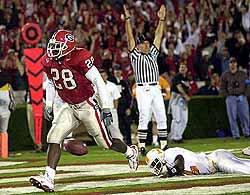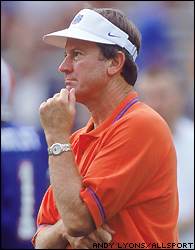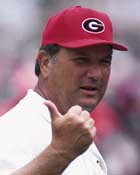Jasper Sanks: Has it Really Been 9 Years?
 On May 15 of last year, Matthew Stafford, the #1 rated quarterback in the country, committed to Georgia. When spring practice starts up in a few weeks, Stafford will step on the field as the most celebrated UGA recruit I can remember. Reggie Brown was pretty big, so was Kregg Lumpkin, so was Durrell Robinson, and so was Sterling Boyd. For my money, however, the only recruit in the last 15 years that might have been more hyped than Stafford is none other than Carver-Columbus’s own Jasper Sanks. To truly understand just how hyped Jasper Sanks was, you have to understand the state of Georgia football at that time.
On May 15 of last year, Matthew Stafford, the #1 rated quarterback in the country, committed to Georgia. When spring practice starts up in a few weeks, Stafford will step on the field as the most celebrated UGA recruit I can remember. Reggie Brown was pretty big, so was Kregg Lumpkin, so was Durrell Robinson, and so was Sterling Boyd. For my money, however, the only recruit in the last 15 years that might have been more hyped than Stafford is none other than Carver-Columbus’s own Jasper Sanks. To truly understand just how hyped Jasper Sanks was, you have to understand the state of Georgia football at that time.When Sanks gave his pledge to Georgia on January 17, 1997, Georgia football was at its lowest point in over 30 years. Georgia was coming off of 4 consecutive seasons of 6 wins or less, and the talent deficit we had with Florida and Tennessee had become quite obvious. That recruiting season was considered “The Year of the Runningback” in the state of Georgia, and Sanks was the most highly rated of a group that included Jamal Lewis, Travis Zachery, Audrell Grace, and Ed Wilder. Georgia lost a lot of recruiting battles that fall, but apparently had won the most important battle of all when they signed Sanks, the first team Parade and USA Today All-American. Every Georgia fan began immediately predicting a return to glory for the UGA football program with Jasper Sanks leading the way.
Sanks’s UGA career got off to a delayed start as he failed to make a qualifying ACT score and was forced to go the Fork Union for a year to get his academics in order. While Georgia was busy putting together a 10-2 season, Sanks actually had a nice season at Fork Union, running for over 1000 yards and being named the team’s Offensive MVP. Sanks re-signed with Georgia in 1998 as part of a recruiting class that was considered by almost every recruiting analyst to be one of the top 5 in the country. This class also included former high school All-American Quincy Carter. The possibility of a Sanks/Carter backfield had many Georgia fans believing that an SEC Championship was not very far off. Unfortunately, Sanks showed up for fall practice overweight and out of shape and found himself down near the bottom of the depth chart. His ankle injury early in the 1998 season would be the first of many injuries that dogged him throughout his career at Georgia. The 1998 season was a lost year for Sanks, who carried the ball only 10 times for 65 yards on the season, with 9 of those carries coming during a blowout of Vanderbilt. It is difficult to understand Jim Donnan's reasoning for burning the redshirt of a guy that was not yet ready to get meaningful carries.
Sanks got off to a very fast start in 1999, running for over 100 yards in 3 of Georgia’s first 4 games (130 v. South Carolina, 147 v. Central Florida, and 156 v. LSU) and really was starting to look like a guy that could emerge into one of the best backs in the country. Unfortunately, the LSU game would prove to be the high point of his career. Sanks was never quite the same for the rest of the season, and the wheels really began to come off the wagon at the end of the year. Against Florida, with Georgia driving deep in Florida territory in the 4th quarter looking to take the lead, Sanks fumbled the ball and Florida recovered. Momentum completely shifted and Georgia never threatened again. However, the play for which Sanks is unfairly best remembered came in the Georgia Tech game a few weeks later. With the score tied 48-48 in the waning seconds, Georgia was trying to set up a game winning field goal inside the Georgia Tech 5 yard line. On the final play before Georgia was going to set up the field goal, Donnan went to Sanks one last time, but Sanks “fumbled” the ball and Tech recovered and went on to win in overtime. Though replays would show Sanks was clearly down, I don’t think Sanks -- or the fans -- ever quite got over that fumble, and he was never a major contributor to Georgia after that point.
Sanks showed up to fall camp in 2000 trimmed down to 220 and was projected to be the go-to back for a team that many expected to challenge for the SEC title. However, injuries kept Sanks out of 2 games and by the end of the year he had lost his starting job to Musa Smith. Sanks finished the season with only 352 yards rushing and averaged only 3.8 yards per carry. Sanks missed spring practice in 2001 because of injuries, and never seriously challenged Musa Smith for the starting job in the fall. By fall practice, Sanks was up to 240 pounds, and his quickness was so diminished that there was talk of moving him to fullback. Sanks stayed at tailback and was Musa Smith’s backup for most of the season. Sanks did a decent job filling in for Smith when necessary and finished the season with 338 yards rushing. However, Sanks’s season and career would end in a way that had pretty much defined his career at Georgia – in disappointment.
I think the lasting image that myself and most Bulldog fans have of Sanks is Auburn stuffing him at the goal line as time ran out in that maddening 24-17 loss. Sanks would go out the next week and quietly run for 50 yards against Ole Miss, but was outshined by Verron Haynes gaining 192 yards on the ground. Then, in the week leading up to the Tech game, Mark Richt announced that Sanks had been dismissed from the team for the always popular “unspecified violation of team rules.” The Jasper Sanks Era was officially over.
Sanks's Legacy:
Whenever Georgia fans begin discussing a highly-touted recruit, someone will invariably say “Let’s hope he is not the next Jasper Sanks.” Sanks is considered the gold standard for what constitutes a recruiting bust. In my opinion, much of the criticism that is thrown Sanks's way isn’t really his fault. First of all, I would not consider Sanks’s career a bust. In my opinion, a complete bust is someone who contributes almost nothing to the team or never even sets foot on campus. Durrell Robinson, Reshard Dudley, Audrell Grace – those guys were busts. Sanks ran for over 1600 yards in his career, which, although I have not checked to be sure, probably puts him among the top 15 or 20 all-time at UGA. So the question that remains is why is it that Sanks’s name invoked such a bitter response among Georgia fans?
Obviously, the hype had a lot to do with it. As mentioned, Sanks was all-everything in high school, had an NFL ready body at 220 pounds, and was coming into a system known for producing great tailbacks. If Sanks had been a 3 star, middle-of-the-road type prospect, then his career would have probably been considered a moderate success. Also, the dire state of Georgia football at the time probably had a lot to do with it. If Sanks had signed this year, no one would be resting the future of Georgia football on his shoulders. Also, the 3 most memorable moments Georgia fans have of Sanks are his fumble against Florida, his fumble against Tech, and him getting stuffed at the goal line by Auburn. Two of those, the phantom fumble and getting stuffed, were not his fault, but he is nonetheless associated with three very bitter moments.
However, the biggest factor is probably the recruits that Georgia missed out on the year that Sanks came out of high school. Donnan was able to land Sanks, but otherwise got his clock cleaned with the in-state recruits that season. In probably the most notorious recruiting coup in Georgia over the last decade, Tennessee came down and grabbed 3 of the state’s top prospects – Deon Grant, Cosey Coleman, and Jamal Lewis. Donnan’s decision making really came under fire the following Fall when a 4-0 Georgia team lost at Tennessee 38-13 as Jamal Lewis ran for over 200 yards. Sanks hadn’t even made it to campus yet. Lewis claimed that Donnan, while recruiting him, had said that Lewis would have to back up Sanks if Sanks and Lewis both came to Georgia. If true, this is a prime example of why betting the farm on a single player is an absolutely terrible recruiting strategy. And this is why for the next 20 years the phrase “I hope this guy isn’t the next Jasper Sanks” will be uttered by uninformed fans when early February rolls around.



